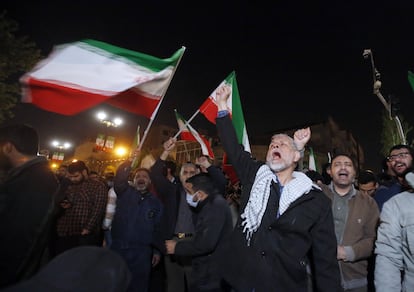Iran: Chronicle of an attack foretold
There are signs that the country calibrated its response to Israel to avoid escalating the conflict

On Sunday morning, Iran fulfilled its threat to respond to the attack against its consulate in Damascus, which was attributed to Israel. The barrages of Iranian missiles and drones have ended speculation about what form the promised revenge would take — retaliation that the United States had predicted 24 hours earlier. It is the first time that the Islamic Republic has directly attacked Israeli territory. Will it be the spark that unleashes a regional war? This will depend on Israel’s response, which will probably depend on the damage caused by the attack.
Despite the alarm in Tel Aviv, Washington and Israel’s neighbors, the Iranian operation was expected. And there are signs that Tehran informed several of Israel’s neighbors of its intentions so that they could warn Israel and minimize the risk of escalation. For a good part of their trajectory, it was even possible to follow the projectiles in real time. In fact, the Israeli army had been preparing for this moment since April 1, when a missile hit the Iranian consulate in Damascus, killing seven senior soldiers, including General Mohammad Reza Zahedi, a key link with the Lebanese Hezbollah militia, Iran’s most important and powerful ally in the Middle East.
As usual, Israel neither confirmed nor denied that it was responsible for the attack, but few had any doubt. The enmity between both countries, which dates back to the establishment of the Islamic Republic in 1979, has intensified since the Hamas attack on October 7. Israeli officials accuse Iran of supporting and financing the Palestinian group. It was not the first time that Israel directly attacked Iranian interests in Syria and even within Iran (where it is blamed for the murder of several nuclear scientists). However, on this occasion, the fact that the target was a high ranking military commander and the context of the war in Gaza put Iran’s supreme leader, Ayatollah Ali Khamenei, in a difficult situation.
“When they attack our consulate, it means they have attacked our soil. [Israel] must be punished and will be punished,” promised Khamenei, who has the final say in national security matters. After six months of tense anti-Israel rhetoric that has not translated into effective support for Hamas, not responding to this affront would have weakened Iran’s image among its allies (the so-called Axis of Resistance that includes Hezbollah, Hamas, Iraqi popular mobilization forces, various Syrian groups and Yemen’s Houthis movement). But above all, Iran ran the risk of widening division in the regime, where the Revolutionary Guard, which is the true power behind the ayatollahs, asked for a forceful response.
At the same time, Khamenei faced a dilemma. Since the start of the war in Gaza, Iran’s diplomacy has been at pains to make it clear that Iran had no interest in a regional war. Its military leaders know that the United States backs Israel and that U.S. intervention would endanger the regime. Hence, Iran took two weeks to gauge the scale of their response (and how to warn Iraq and Jordan in advance about the missiles and drones that would be flying over their airspace, information that was undoubtedly passed on to Washington) in an attempt to limit Israel’s anger and the chances of an escalation with unpredictable consequences. It is still too early to know whether Iran achieved its goal.
Sign up for our weekly newsletter to get more English-language news coverage from EL PAÍS USA Edition
Tu suscripción se está usando en otro dispositivo
¿Quieres añadir otro usuario a tu suscripción?
Si continúas leyendo en este dispositivo, no se podrá leer en el otro.
FlechaTu suscripción se está usando en otro dispositivo y solo puedes acceder a EL PAÍS desde un dispositivo a la vez.
Si quieres compartir tu cuenta, cambia tu suscripción a la modalidad Premium, así podrás añadir otro usuario. Cada uno accederá con su propia cuenta de email, lo que os permitirá personalizar vuestra experiencia en EL PAÍS.
¿Tienes una suscripción de empresa? Accede aquí para contratar más cuentas.
En el caso de no saber quién está usando tu cuenta, te recomendamos cambiar tu contraseña aquí.
Si decides continuar compartiendo tu cuenta, este mensaje se mostrará en tu dispositivo y en el de la otra persona que está usando tu cuenta de forma indefinida, afectando a tu experiencia de lectura. Puedes consultar aquí los términos y condiciones de la suscripción digital.









































